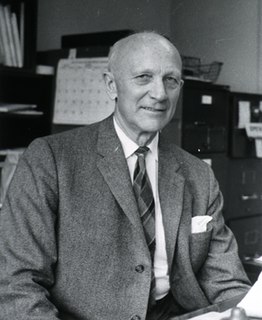A Quote by Edmund Burke
I consider how little man is, yet, in his own mind, how great. He is lord and master of all things, yet scarce can command anything.
Related Quotes
No matter how vast your knowledge or how modest, it is your own mind that has to acquire it. It is only with your own knowledge that you can deal. It is only your own knowledge that you can claim to possess or ask others to consider. Your mind is your only judge of truth - and if others dissent from your verdict, reality is the court of final appeal. Nothing but a man's mind can perform that complex, delicate, crucial process of identification which is thinking. Nothing can direct the process but his own judgment. Nothing can direct his judgment but his moral integrity.
In spite of all these disquieting triumphs in the field of natural science, it's astonishing how little man has learned about himself, and how much there is to learn. How little we know about this brain which made social evolution possible, and of the mind. How little we know of the nature and spirit of man and God. We stand now before this inner frontier of ignorance. If we could pass it, we might well discover the meaning of life and understand man's destiny.
How do I know that loving life is not a delusion? How do I know that in hating death I am not like a man who, having left home in his youth, has forgotten the way back?...someday there will be a great awakening when we know that this is all a great dream. Yet the stupid believe that they are awake, busily and brightly assuming they understand things, calling this man ruler, and that man a herdsman- how dense!
The difference between the novice and the master is simply that the novice has not learnt, yet, how to do things in such a way that he can afford to make small mistakes. The master knows that the sequence of his actions will always allow him to cover his mistakes a little further down the line. It is this simple but essential knowledge which gives the work of a master carpenter its wonderful, smooth, relaxed, and almost unconcerned simplicity.
When some one sorrow, that is yet reparable, gets hold of your mind like a monomania,--when you think, because Heaven has denied you this or that, on which you had set your heart, that all your life must be a blank,--oh, then diet yourself well on biography,--the biography of good and great men. See how little a space one sorrow really makes in life. See scarce a page, perhaps, given to some grief similar to your own, and how triumphantly the life sails on beyond it.
Habit hath so vast a prevalence over the human mind that there is scarce anything too strange or too strong to be asserted of it. The story of the miser who, from long accustoming to cheat others, came at last to cheat himself, and with great delight and triumph picked his own pocket of a guinea to convey to his hoard, is not impossible or improbable.
In a room sit three great men, a king, a priest, and a rich man with his gold. Between them stands a sellsword, a little man of common birth and no great mind. Each of the great ones bids him slay the other two. ‘Do it,’ says the king, ‘for I am your lawful ruler.’ ‘Do it,’ says the priest, ‘for I command you in the names of the gods.’ ‘Do it,’ says the rich man, ‘and all this gold shall be yours.’ So tell me—who lives and who dies?
I saw more clearly than ever, that the first great and primary business to which I ought to attend every day was, to have my soul happy in the Lord. The first thing to be concerned about was not, how much I might serve the Lord, how I might glorify the Lord; but how I might get my soul into a happy state, and how my inner man may be nourished...I saw that the most important thing I had to do was to give myself to the reading of the Word of God and to meditation on it.










































